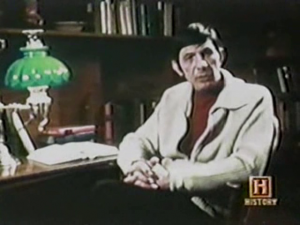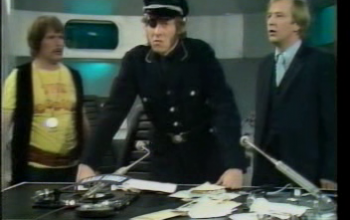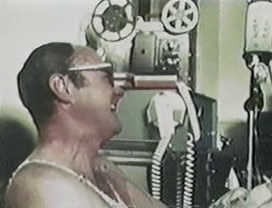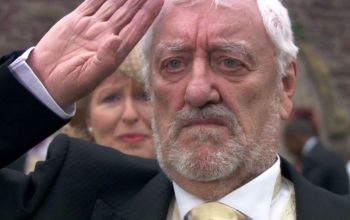In Search Of… S01E11 Psychic Detectives
We open on a man handling a ring. Nimoy tells us that the man claims that he can visualise scenes related to the ring. There’s stock footage of police cars and then back to the man with the ring. We’re told he’s Peter Hurkos and that he has ‘hard information’. Names, places, dates. “He calls himself a psychic detective,” Nimoy intones. A big claim, from Mr Hurkos — yet one that this episode seems to have little interest in investigating.

We go on to see Chief Detective Lowry, a 1970’s cop in St Louis. We’re assured that he solves crimes by conventional means. That is, until a kidnapping case in the mid ’70s, where he couldn’t find the victim. At the request of the victim’s family, Lowry called in a psychic, who located the kidnapping victim. Fascinating, if true.
Back to Mr Hurkos. We’re told that he gets pictures in his mind from places and objects associated with crimes, and has worked on over eight hundred cases.
And we’re done with Hurkos now. Sorry, Hurkos. We’re in Chicago looking at Irene Hughes who has supposedly helped police in fifteen murder cases.
Now St Louis, and Bevy Jaegers.
Recovering from the whiplash change of direction, we see Bevy and a group of 1970s people in a suburban living room. Bevy is talking about a case to them. Bevy is a housewife who believes that anyone can be a psychic detective, and has a group that helps her investigations. Nimoy tells us that they are ‘so effective’ that they’ve been given PI licenses. I only know a little about PI licensing in the States, but enough to know that being an ‘effective investigator’ isn’t a precondition for a license.
Bevy explains that private detectives are mysterious and psychic detectives even more so. She mocks the idea that her group is doing anything strange. We talk to one of her agents, a student who claims that she can detect pain. Another uses psychometry, or object reading, and seems to believe that the crime they’re investigating is connected to an Indian cult. Her husband feels he can pinpoint a crime and so on. There is an emphasis here on showing that all of these people are everyday types, albeit excessively ’70s-ish.
We look at some of Bevy’s cases, beginning with the search for a missing housewife in 1971. We’re told the details of the disappearance, and told that police were baffled. Then Bevy Jaegers contacted a newspaper and told a 1970s era editor with her hunch. The editor — who looks like he’s taking some time out from yelling at Karl Kolchak or possibly demanding pictures of Spider-Man — says that Bevy told him that the missing woman’s car would be found by a large body of water.
It’s funny. When he said ‘body of water’, I started picturing a lake. Turns out the car was found by the Gulf of Mexico. Either I’m a lousy psychic, or ‘large body of water’ is a vague description. Hell, maybe both, why not. Anyway, Bevy got to go out and sit in the car. A cop describes watching the event. Bevy seemed to go into a trance, and described some of the images she saw. Bevy went looking for a location that matched her impressions. There’s a nicely crappy re-enactment of her search, guided by ‘an inexplicable force’.
They pad it out a bit, build the tension nicely, as Bevy homed in on her target. They searched until nightfall, meaning to search again the next day. Rain prevented further searching, but the missing woman’s body was found not far from where she was searching. The woman had been killed in a way Bevy had predicted.
Back at Bevy’s ‘Psychic Rescue Squad’ they’re talking their way through the case of a missing travel agent, and we leave them there.
This is an odd episode, giving quite a lot of time to the re-enactment of a single case, which is weird given the early claim that psychic detectives have had many, many successes. This makes it all a little hard to judge. I mean, I’m not a believer and I would need a lot more than this to convince me. By the same token, I am a lot less informed on this sort of thing than I am with some of the other topics this show covers, so I can’t easily attack its factual accuracy. But, Iike I say, debunking is not really the point of these reviews. It’s just an added bonus you get sometimes.
You’re welcome.
The episode is nicely creepy; the appearance of hard-headed cops and newspapermen (which, I gather, is what journalists were called in the 1970s) counterpoints Bevie’s eccentrics nicely. The search for the missing woman is nice and tense, but some of the tension is mitigated by the obvious truth that they wouldn’t be showing us this if she wasn’t found. All up, not a bad episode, a nice sort of slow-moving palate cleanser after the actual information of Martians and the overstuffed Atlantis.
Best Lines
Nimoy: “It is not inconceivable that the role of the psychic detective could have major consequences for law enforcement in the United States. If the technique of using ESP to pinpoint crime can be developed on a broad and practical scale, it may become a deterrent to anyone contemplating a criminal act. This, it seems, may not be beyond the power of the mind.”
Bevie Jaegers: “We have had quite a job to do, as a matter of fact, in getting people to understand that we’re not a bunch of mysterious kooks running around in robes, calling down forces from the planet Mars.”
Summing up:
Tension: 6/10, Music: 5/10, Nimoyness: 6/10, Breadth of detail: 5/10, 1970sness: 9/10. Overall: 31/50. Pass



